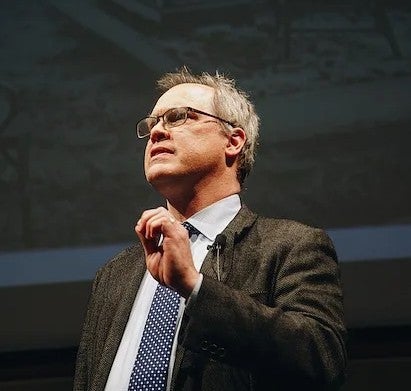Winter 2026
Tuesday 9:00am-11:00am
Wednesday 11:00pm-1:00pm
By appointment
Zoom office: https://uoregon.zoom.us/j/5255635155?pwd=T3hyc2taR2Z0RjVRRnlpTGVKQ1Z4dz09
210 Chapman Hall
ACADEMIC AREAS: Information Science, Speech and Debate, Public Speaking, Scholarly Communication Networks, Scholarly Research, Political Communication, Legal Advocacy and Persuasion, Social Network Analysis, American Foreign Policy
Teaching Philosophy
My aim is to help prepare students to achieve their greatest potential as scholars and informed citizens. In my classes and in working with students in forensics, my aim is to help students form, analyze, and critique a range of types of argumentation and enhance their advocacy skills. My work in information science aims to help students become active and effective participants in the intellectual life of scholars.
Past Courses
HC231 Oral Advocacy and Argumentation
HC231 Public Speaking
HC301 Network Analysis
HC431 Play ball! A social history of America
HC477 Thesis prospectus

Oregon Forensics
Professor Jacobsen leads Oregon Forensics which includes the debate and mock trial. Oregon Forensics provides all Oregon students the opportunity to translate what they learn in the classroom into a variety of different contexts, and to carefully and deeply consider different points of view on a broad range of important social and political topics.
Dr. Jacobsen was a highly decorated debater during his undergraduate years at the University of Oregon. As a forensics educator, Jacobsen has led strong teams to national success at Cornell, University of Vermont, and University of Alaska - Anchorage. Since arriving at Oregon in 2013, his teams have consistently risen in national rankings, including a 2022 National Championship. Under his leadership the number of students participating in debate and mock trial has grown rapidly and several important new initiatives are now underway, including scholarships, an energized alumni network, and deepening partnerships with leaders and institutions on and off campus.
With regional colleagues, Dr. Jacobsen has taken a lead in developing a new format of college policy debate designed to better meet the needs of contemporary students, emphasizing education, community, and competition.
Academic Background
Ph.D., Information Science, University of Michigan - Ann Arbor, 2014
B.S., Sociology, University of Oregon, 2002
Research Interests & Current Projects
Trond Jacobsen's prior professional experiences in college forensics, political campaigns, and as a law librarian reveal an abiding interest in how scholarly knowledge is produced, disseminated, preserved, and used - particularly in argumentative or adversarial contexts. He studies these processes in specialized contexts such as legal proceedings, scholarly communications networks, laboratories, political campaigns, cultural heritage institutions, and debate competitions. His dissertation "The Identity of Evidence: Documentary Evidence in the Federal Acknowledgement Process" analyzes how petitioning tribes mobilize records, and how federal officials interpret those records as documentary evidence in an administrative proceeding used to determine whether the petitioners merit tribal status under federal law.
Selected Publications
For a complete publication list see Professor Jacobsen's Curriculum Vitae.
Articles
- Forthcoming 2025, "The Impertinence of Argument: The 1927-28 University of Oregon World Debate Tour" (Jacobsen T, Frank D), Studies in Debate and Oratory.
- 2019, "Experiencing Evidence: The Limits of the Local" Alta Argumentation Conference, August 1-4, 2019. Theme: Local Theories of Argument.
- 2013, "Invoking Collective Memory: Mapping the Emergence of a Concept in Archival Studies" (Jacobsen T, Punzalan R, Hedstrom M), Archival Science, 13: 217-251.
- 2012, "Reusing Scientific Data: How Earthquake Engineering Researchers Assess the Reusability of Colleagues’ Data" (Faniel I, Jacobsen T), Computer Supported Cooperative Work, 19(3-4): 355-375.


